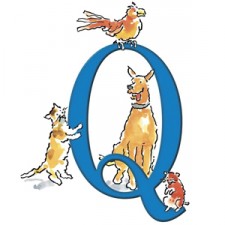Cats and dogs are naturally curious creatures. This curiosity, however, can sometimes get them into trouble. According to the ASPCA’s Animal Poison Control Center, nearly 180,000 cases of possible poison exposure were handled in 2013. Items that can be toxic to your pet can seem fairly benign to us: garlic, grapes, chocolate, plants, and others. It is important to have some idea of what could be harmful to your pet. Here’s an overview of the top ten toxins pets might encounter in and around the home:
1. Prescription medications
By far, the most calls received by our practice (and most likely by the Poison Control Center) are regarding pets ingesting medications intended for human consumption. Remember when you dropped that pill and couldn’t locate it? Dogs are more likely to ingest medications, but cats can sneak the occasional pill, especially if it is flavored. Antidepressants, blood pressure products, and pain medications ranked at the top three of reported ingestion.
2. Insecticides
Cats have a high risk of coming in contact with insecticides both indoors and outdoors. Ant baits, household sprays, and outdoor yard treatments may contain chemicals that can cause reactions ranging from skin irritation to seizures. Many topical flea medications intended for use with dogs can have serious side effects if applied to the skin of a cat, or if the cat happens to get a lick of a product off a dog friend’s fur.
3. Over-the-counter medications
If eaten, anti-inflammatory medication such as ibuprofen, aspirin, acetaminophen, and other similar products can affect your pet’s liver, kidneys, and gastrointestinal tract. Other common supplements (fish oils, herbal medications) can also be appealing to our pets and potentially make them ill if consumed inappropriately.
4. Household products
There are an assortment of commonly used, potentially hazardous materials that pets can come in contact with such as cleaning products (bleach), alkaline batteries, paints, solvents, and fuels (kerosene, gasoline). These items can be extremely corrosive and harmful to the gastrointestinal tract of animals.
5. Human Foods
Garlic or onions, grapes, raw bread dough, and the artificial sweetener xylitol all pose potentially lethal threats to our pets. Did you know grapes and raisins can cause kidney failure in dogs? Or that onions can lead to serious blood disorders if your pet eats them? If you do feed your pets the occasional table scrap, consult your veterinarian for a more detailed listing of hazardous people foods for pets.
6. Medications for pets
Veterinary products like heartworm medications, flea controls, and joint supplements can come in flavored varieties to entice your pet to take the medication. However, this can tempt them to eat more than they need if given the opportunity.
7. Chocolate
There are varying levels of toxicity in chocolate based on the level of substances called methylxanthines (caffeine and theobromine are the most common). These compounds can cause hyperactivity, vomiting, or seizures. Unsweetened baker’s chocolate contains the highest levels of these chemicals, making it the most dangerous. Milk chocolate contains lower levels, but still can be potentially harmful.
8. Mouse or rat bait
There are three main types of rodent baits that are used in pest control. These are of particular concern to our pets as life-threatening disorders can develop including internal bleeding, seizures, and kidney failure. Knowing which chemicals your pet has been exposed to in the event of a reaction can greatly help in the appropriate treatment of your pet when you visit the veterinarian.
9. Plants
Cats are notorious plant eaters, but dogs are also likely to do some spontaneous Pruning of houseplants. Eating plant matter can cause a wide range of clinical responses ranging from drooling and gastrointestinal irritation to kidney failure. For a comprehensive list of plants that are toxic to your pets, visit ASPCA.org, HumaneSociety.org, or ask the veterinarian at your pet’s next appointment.
10. Lawn and garden products
The most common lawn products ingested are fertilizers. Organic fertilizers such as bone or blood meal and dehydrated manure can smell great to your pet and lead to accidental ingestion. Side effects depend on the volume eaten, from mild gastrointestinal irritation to obstruction of the gastrointestinal tract. Synthetic fertilizers are less tempting, but can still be ingested. These are more serious, causing nervous system reactions such as tremors or seizures.
 You can help keep your pets out of harm’s way by ensuring that chemicals, drugs, and dangerous food products are kept well out of reach (or behind closed doors). If you know or suspect your pet has eaten or been exposed to any of these items, contact your veterinarian immediately. Additionally, the ASPCA Poison Control Center has a website with even more extremely useful information on this topic: ASPCA.org.
You can help keep your pets out of harm’s way by ensuring that chemicals, drugs, and dangerous food products are kept well out of reach (or behind closed doors). If you know or suspect your pet has eaten or been exposed to any of these items, contact your veterinarian immediately. Additionally, the ASPCA Poison Control Center has a website with even more extremely useful information on this topic: ASPCA.org.




